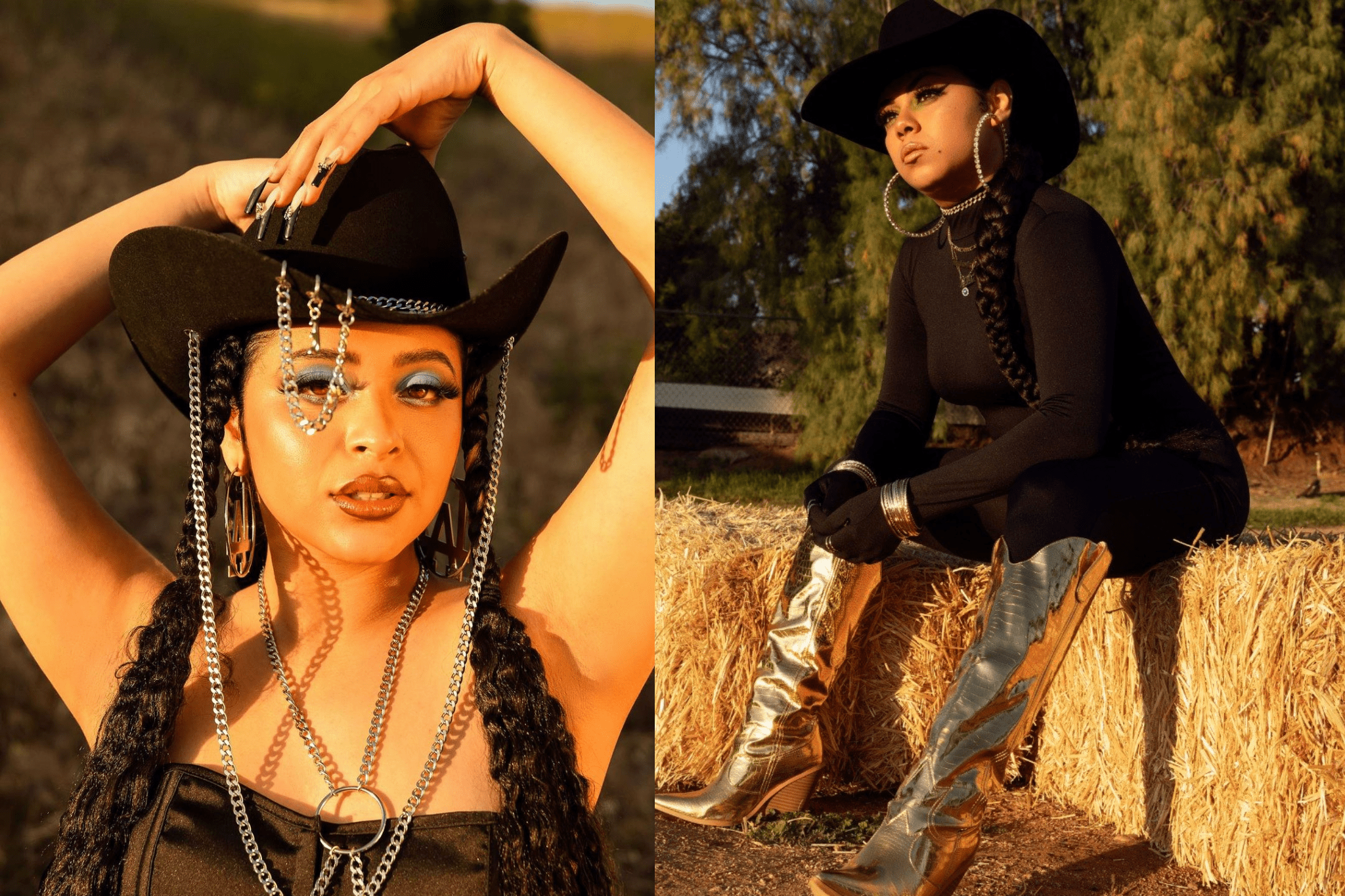If there’s anything that the Bésame Mucho festival brought to light, it has to be how younger generations of Mexican Americans are now more than ever embracing both the old and new when it comes to fashion and music. In return, you get people who are transforming vaquero culture and making it their own.
Like Morena Mía a fashion brand in Los Angeles that’s owned by Riverside native Alejandra Jiménez who is working to embrace both the old and new with her tejanas. Jiménez’s brand is a perfect example of the rise in admiration for Mexican vaquero fashion. Visiting her online shop feels like she took your personal Spotify playlist that has a mix of hip hop, quebraditas, alternative, punk, and cumbias, and fused all of them together to form a tejana that fully represents you and your inner emo, rocker little heart. More importantly for her, it’s a way of connecting and preserving her culture and family memories.
“My upbringing and my family have definitely influenced and inspired what goes into my brand,” said Jiménez. “
Since she was in diapers, she has been rocking a tejana. No really. Vaquero culture, quebraditas y banda was part of this Latina’s weekly life. In the late 90s, her mother Wendy, who is from Guadalajara, and her dad José, who is from Zacatecas, were both quebradita champions in Los Angeles, and they have the trophies to prove it. Their style was everything, fringe tops, botas (boots), blouses opened halfway down to show off their gold chains, and to complete the look, there was always a tejana. Like salsa on tacos, no outfit went without a tejana and boots, and the two were always paired together.
Growing up, Jiménez also recalls her family’s yearly visits to her grandparent's rancho, where she ran free in the sierras de Zacatecas, memories that she said are ingrained in her mind.
“I remember my grandpa en el rancho. No matter what he was doing, he would always have his tejana and boots on,” she said with a smile filling her face. “And back home, my parents had their own version of this, so it was something that was embedded in my family on both sides of the border.”
She grew up viewing fashion as having the power to transform someone, the one person she noticed it on the most was her dad. She said whenever he wanted to look good, he would slap on some cologne and grab his tejana.
“I remember seeing his confidence change; it was like seeing magic when I would see him put on his tejana,” she described. “Because he would go from being this tired person who just worked a 16-hour shift, but once he’d put on his Chalinillo suit and his tejana, he would transform, and you can see confidence radiate from him.”
She added: “That's how I want my customers to feel, to feel this confidence the moment they put one on.”
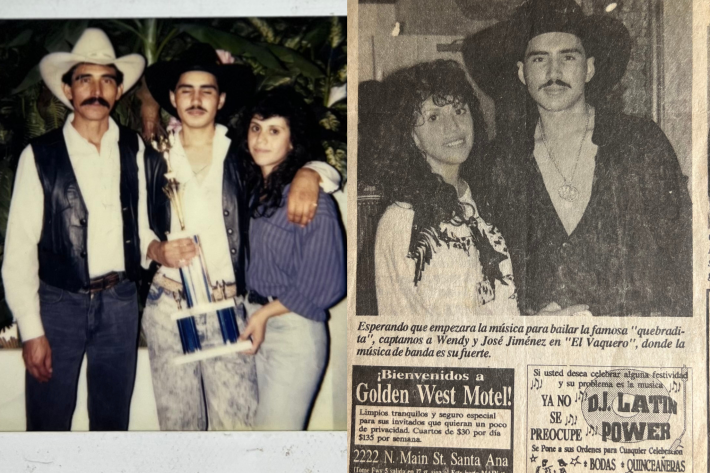
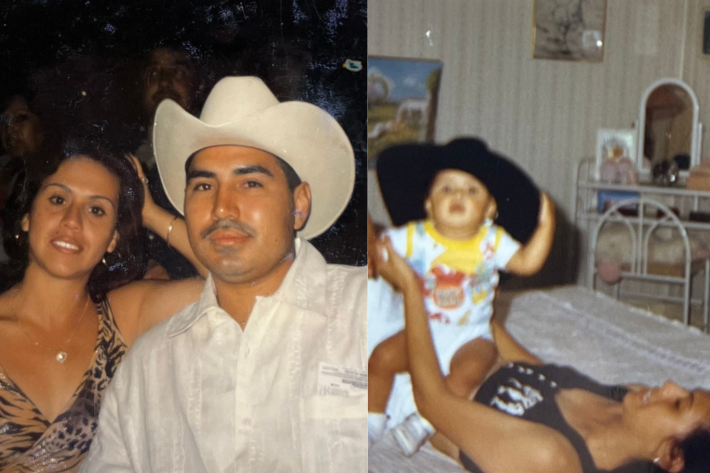
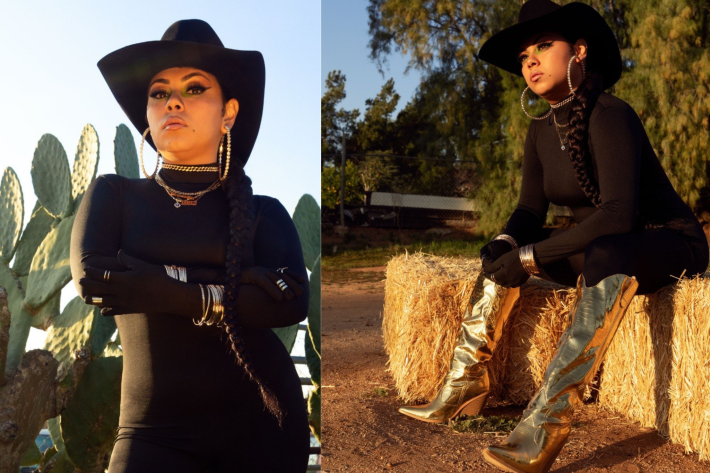
For Jiménez, the journey to where she is now hasn't been easy or clear, she originally was going to college to study law due to her parent's undocumented status. “That always hung over me, the fact that I had this hyper-awareness that I was living in an undocumented household,” she said. “But I realized that that dream of studying law was stemming from being in survival mode.”
Eventually, the now-fashion designer and business owner decided to tap into the dreams of her inner child, and she quickly realized that the one constant interest throughout her life had always been fashion.
“Growing up, sometimes we had money, sometimes we didn’t, but I was always going to show up best dressed,” she said via Zoom. “I didn’t care if we were going to yardas (yard sales) or segundas I was gonna make it work.”
Also driving her to start a signature tejana line was the need to preserve that very culture she grew up in. Something she felt was very needed.
“I noticed that I didn't see younger generations sporting or embracing vaquero culture. I thought, ‘if you can rock your dunks with pride, you can rock a tejana too,’” she said. “I think a lot of people rejected this style for a long time, but you can have fun mixing our culture into whatever we wear now.”
So she started Morena Mía, starting with a tejana line. Some tejanas have chains to represent both the rockera side of her and also the chains her father wore to the dances. There’s even one designed in honor of the late Jenni Rivera named mariposa de barrio. After all, her brand's motto is: "Making the Barrio Our Runway" this is an ode to barrio fashion and a nod to anyone who has made do with what they have.
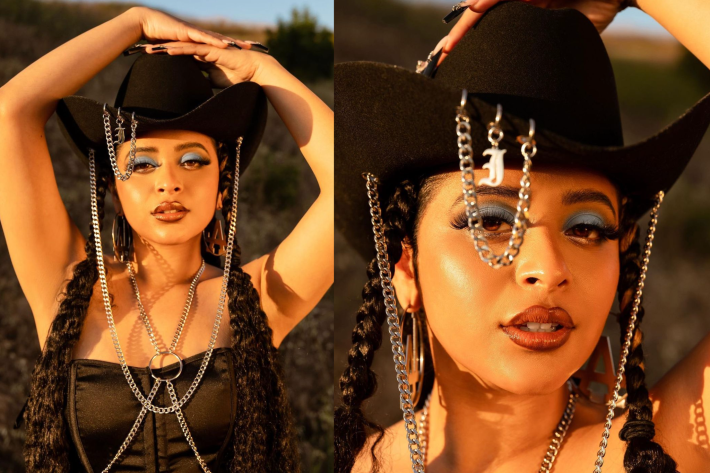
“I want our lines to make people feel good. I want to create a line that is inclusive, so anyone can rock these hats. I’m queer, so it's very important to me,” she said. “I want everyone to feel confident when wearing anything Morena Mía and know how beautiful they truly are.”
The Power of Latinos in Fashion
“I don't want to carry fast fashion; I want to carry innovative and high-end fashion,” she said. “A lot of people may think of Mexican fashion as being cheap in cost, but I wanted to break that belief down.”
She’s not wrong. Often, many Latino-owned brands are criticized by their own Raza for pricing their items “too high,” not considering the quality of material used or the long hours it takes to fulfill an order. Her logic: Would you walk into Gucci and ask for a discount? Probably not, so why ask up-and-coming businesses for one?
“Latinos are starting to see the value in their work, and I think we shouldn't be afraid to create something beautiful and price it accordingly,” Jiménez said. “People don’t get to see the behind-the-scenes and all the work that goes into making a dream come true. You also don’t need to prove your work’s worth. There’s always someone who will see your vision.”
Jiménez is not wrong; Latino businesses and their owners are growing and are beginning to take up much-needed space in the market; according to Forbes Latino business owners have grown 34% from 2009 to 2019. And it’s only growing, with brands like Hija De Tu Madre, Paisa Boys, and who can forget Equihua the clothing brand making jackets out of San Marcos blankets skyrocketed in the last couple of years.
“Anyone that comes from an undocumented household is gonna come with a lot of money wounds and a lot of feeling like spiritually unaligned with money,” she explains. “Like we self-doubt a lot, so I had to deal with that before I even started this.”
The moment she let go of that, she launched her tejana line, and now she’s launching her new collection called “Fringe Me.” Where she provides different styles of jackets, long and short with fringe, similar to the ones her mother used to wear when going out to dance. Although her shop is currently only online, she said she does hope to one day open up a brick-and-mortar shop in Los Angeles.
“I never even considered this as being possible,” she said in disbelief. “In the end, it's about bringing the rancho culture back and preserving it. It's a way for me, for us, to connect with our ancestors who dressed their heads and bodies with tejanas, botas, and fringe.”
Follow @ShopMorenaMia on Instagram.
